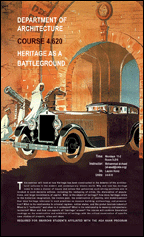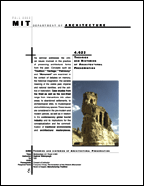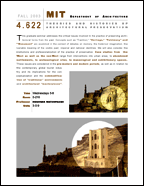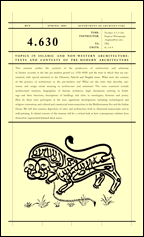Faculty» Past Faculty
Associate Professor, Aga Khan Career Develpment Professor
(Permanent Faculty Fall 2001 through Spring 2005)
Fall 2001-Spring 2005 courses
4.609-4.696. Seminar in the History of Art and Architecture/ Special Studies in theHistory, Theory and Criticism of Architecture and Urban Form. Cosmopolitan Cities of the Mediterranean in the Early Modern Era
Heghnar Watenpaugh/Carla Keyvanian Building on the recent scholarly debate on reintegrating the Mediterranean and reconsidering the interconnectedness of its shores, this graduate seminar focuses on the study of Mediterranean cities in the early modern era cross culturally (15th-19th century). Through a thematic structure we will use a comparative approach to the study of cities and questions of cosmopolitanism. Key themes include: The politics of urban design, civic institutions, representations of power, the spatial dimensions of the social construction of difference, including gender, ethnicity, race and religion, and spaces of sociability (taverns, coffeehouses, places of entertainment). In addition we will consider issues of mapping, the representations of cities, and their imageability. Case studies will include Istanbul, Cairo and Aleppo under Ottoman rule (in Turkey, Egypt and Syria of today), Paris (France), Rome, Florence and Venice (Italy), Granada (Spain) in the 15th and in the 19th century. The seminar will also address the resonance of the architecture of the past for urban form and practice today. The seminar will offer ample opportunity for a comparative approach to the study of cities as it will be jointly oled by an expert on Islamic urbanism and a scholar of western urbanism of the early modern period. The course is open to graduate students and qualified undergraduates. No background in specialized architectural history is required. |
 |
4.620 Issues in Modern and Contemporary Islamic Architecture and Urbanism: Heritage as a Battleground
This seminar will look at how Heritage has been constructed in the debates of the architectural cultures in the modern and contemporary Islamic world. Why and how has heritage come to name a cluster of issues and values that galvanizes such strong positions and is invoked in such decisive actions, including the reshaping of cities, the dislocation of populations, and large investments of capital. What is the object of heritage? How does heritage relate to the historical imagination, the visible past, the construction of identity, and modernization? How does heritage intervene in such practices as museum building, archaeology, and preservation? What is its relationship to colonial regimes, nation states, and the global tourism industry? When is it “authentic” and when is it contested? What is its relationship to memory and spectacularization? When and how are aspects of “heritage” erased? The course will combine theoretical readings on the construction and exhibition of heritage with the critical examination of specific case studies of projects, sites and ideas. |
 |
 |
4.622 Theories and Histories of Architectural Preservation
This graduate seminar addresses the critical issues involved in the practice of preserving architectural forms from the past. Concepts such as “Tradition,” “Heritage,” “Patrimony,” and “Monument” are examined in the context of debates on memory, the historical imagination, the variable meaning of the visible past, imperial and national identities. Major theoretical interventions by Riegl, Ruskin, Viollet-Le-Duc and others, and their legacy are studied. We will also consider the institutions and professionalization of the practice of preservation. Case studies from the West as well as the non-West range from interventions into urban areas, to abandoned settlements, to archeaological sites, to museological and exhibitionary spaces. These issues are considered in the pre-modern and modern periods, as well as in relation to the contemporary global tourist industry and its implications for the conceptualization and the commodification of “traditional”environments and architectural “masterpieces”. |
 |
4.630 Topics In Islamic and Non-Western Architecture: Texts and Contexts of Pre-Modern Architecture
This seminar studies the contexts of the production of architecture and urbanism in Islamic societies in the late pre-modern period (ca. 1550-1850) and the texts in which they are rep- resented, with special attention to the Ottoman, Safavid and Mughal states. What were the contexts of the practice of architecture in the pre-modern era? What are the texts that describe, rep- resent, and assign social meaning to architecture and urbanism? The texts examined include architectural treatises, biographies of famous architects, legal documents relating to build- ings and their functions, descriptions of buildings and cities in travelogues, histories and poetry. How do these texts participate in the eraís significant developments including technological and religious innovation, and cultural and commercial interconnections in the Mediterranean Sea and the Indian Ocean. We will also examine depictions of cities and architecture, both in illustrated manuscripts and in wall painting. A related concern of the seminar will be a critical look at how contemporary scholars have themselves represented/debated these issues. |
4.631 4.632 Gender, Space, Architecture
These courses place issues of gender at the center of explorations of space and architecture. We will work with theoretical and multi-disciplinary texts to consider gender in relation to particular architectural sites, projects and ideas. The core debates on women and gender in art and architectural history are introduced. In-depth analyses of selected works of art and architecture from various historical contexts highlight issues including gendered practices of space, vision and power, masculinity, and cyberspace. Special emphasis is placed on the experience of women and men in Third World contexts. No background in art of architectural history is required. |



